|
|
|
Sort Order |
|
|
|
Items / Page
|
|
|
|
|
|
|
| Srl | Item |
| 1 |
ID:
174891
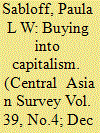

|
|
|
|
|
| Summary/Abstract |
Interviews with 864 everyday Mongolians in Hovd, Ulaanbaatar, and the surrounding countryside in 1998 and with 410 from the same locations in 2003 reveal they have an increasing appreciation of capitalism. Yet during the time of the research, Mongolians experienced economic and climatic hardships. Why would interviewees favour capitalism under such conditions? Cognitive analysis suggests that interviewees associate capitalism with the benefits of democracy, especially the economic and political freedoms gained since the demise of socialism. They anticipate not only that capitalism will allow them to improve their lives and make their own decisions but also that it will improve Mongolia’s standing in the world. Statistical analysis suggests respondents’ strong correlation between capitalism and democracy. It also suggests correlation between respondents’ perception of capitalism and risk (mostly optimism). However, their association of capitalism with democracy is greater than its correlation with risk perception. Therefore, I surmise that their love of democracy outweighs their concern for their economic future.
|
|
|
|
|
|
|
|
|
|
|
|
|
|
|
|
| 2 |
ID:
174886
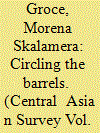

|
|
|
|
|
| Summary/Abstract |
Most of Kazakhstan’s wealth hinges on oil rents, and the overall performance of the economy is closely linked to petroleum’s price fluctuations. This study asks (1) why the institution of private ownership of oil proceeds has not led to a positive transformation of patron–client relations embedded in the country’s energy sector, thus challenging the relevance of the ‘private ownership’ narrative, and (2) why the collapse in the price of oil did not affect the stability and essential character of the regime in power. To answer these questions, the article examines two case studies: the privatization of the oil sector in the 1990s, and the post-2014 oil crisis. Thus the article problematizes important theories on oil-sector privatization and contributes to recent work on regime stability as it pertains to the resource curse. The analysis of the constitutive impact of oil wealth on Kazakh politics generates wider insights on the links between the power of informal networks and regime stability in petrostates through boom and bust cycles.
|
|
|
|
|
|
|
|
|
|
|
|
|
|
|
|
| 3 |
ID:
174892
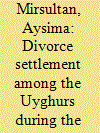

|
|
|
|
|
| Summary/Abstract |
Family law is an important constituent of law that deals with social relations within the family and the household. It regulates conflicts concerning marriage, divorce, child custody, adoption, inheritance and so on. During the Chinese Republican era (1912–1949), as a continuation of the practice in Imperial China, the settlement of conflicts emerging in the Uyghur domestic sphere was governed by Islamic law. In this article, based on several text corpora consisting of legal documents originating in southern Xinjiang (Khotan and Kashgar) from the Republican era, I will analyse the reasons behind such disputes and the final decisions made by Muslim judges. It will also touch upon women’s position in pre-socialist Uyghur society, the role of village elders and fathers-in-law, patterns of dispute settlement, the influence of the different forms of divorce, and the parameters for further research on the texts.
|
|
|
|
|
|
|
|
|
|
|
|
|
|
|
|
| 4 |
ID:
174887
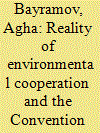

|
|
|
|
|
| Summary/Abstract |
Using insights from classical functionalism, this article analyses the complex relationship between the Convention on the Legal Status of the Caspian Sea and the Caspian Environment Programme (CEP). The article pursues three objectives. First, it shows how shared ecological issues challenged individual littoral states and brought their respective governments under the CEP umbrella in 1998. Second, it shows how key actors (UNEP, UNDP, GEF, and World Bank – besides states) are involved in shaping the politics of the Caspian Sea region and how their preferences, both political and economic, and networks affect the capacity, opportunity and will of governments (e.g., ministries, parliaments and presidents) to cooperate. Third, it explains the link between low environmental politics and the uncertain legal status of the Caspian Sea. I find that lessons learned from environmental cooperation spilled over into the discussion of the legal status of the sea, which culminated in the signing of the Convention.
|
|
|
|
|
|
|
|
|
|
|
|
|
|
|
|
| 5 |
ID:
174883


|
|
|
|
|
| Summary/Abstract |
In 1997 a monument dedicated to Heroes of the Soviet Union Aliya Moldagulova and Manshuk Mametova was unveiled on the former site of the monument to Lenin in central Almaty. This case study investigates the valorization of these Soviet-era World War II heroes in independent Kazakhstan, and argues that the Kazakhstani state has recast these heroes as significant figures in the official centuries-long history of Kazakhstan. Incorporating and commemorating the Soviet experience of World War II as part of the narrative of an independent state provides an avenue for legitimating Kazakhstani nation-building efforts. Incorporating regionally important stories of women heroes through monuments and commemorative activities demonstrates the symbolic and instrumental roles that monuments in public spaces play in reinforcing officially acceptable gender roles and in structuring power relations between the regions and the centre in Kazakhstan and between Kazakhstan and Russia.
|
|
|
|
|
|
|
|
|
|
|
|
|
|
|
|
| 6 |
ID:
174890


|
|
|
|
|
| Summary/Abstract |
This article reveals the transformation of Kazakh music through the tamada in Bayan-Ölgii Province in Mongolia in the post-socialist period. The tamada (master of ceremonies) is an office common across Central Asia, the Caucasus and Russia. In Bayan-Ölgii, where 90% of the population is Kazakh, weddings have been held in a large hall in the town since the 2000s. The tamada has played a central role in these events, in the playing of music. This article focuses on the history of activities of the tamada and shows that they not only have a role in advancing programmes in wedding ceremonies but also form the contents of these events. In addition, tamada play popular songs using new technology, which has prompted the transformation of music in weddings.
|
|
|
|
|
|
|
|
|
|
|
|
|
|
|
|
| 7 |
ID:
174884


|
|
|
|
|
| Summary/Abstract |
In recent years, many have said that democracy globally is being rolled back and that it is the source of much dissatisfaction. This article presents the findings from a survey of Kazakhstani university students on how they view democracy. The vast majority of participants view democracy as consisting of civil and political rights (i.e., the Western concept of democracy). However, also based on our survey results, our main argument is that, if forced to choose, they consider social services and economic development more important than political and civil rights. Another finding is that Muslims demonstrate stronger support for democracy than non-Muslims.
|
|
|
|
|
|
|
|
|
|
|
|
|
|
|
|
| 8 |
ID:
174888
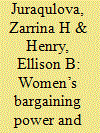

|
|
|
|
|
| Summary/Abstract |
This article aims to examine the relationship between women’s household bargaining power and their adoption of modern contraception in post-Soviet Tajikistan using the 2012 Demographic and Health Survey. The study uses direct measures of bargaining weights: a woman’s ability to make decisions about her own health care; visits to her family or relatives; and contraceptive use. An additional measure defining a woman’s financial capability to receive medical treatment for herself is added in the analysis to understand its correlation to women’s contraceptive-use behaviour. The probability of using contraception is 187 percentage points higher for a woman who has both control over her own health care and financial means to get medical help than a woman who does not have these choices. Having a say in the decision to control births increases the probability of using contraception by 98 percentage points. Our findings reveal that certain aspects of a woman’s household decision-making and financial freedom are relevant to explain her contraceptive-use behaviour.
|
|
|
|
|
|
|
|
|
|
|
|
|
|
|
|
|
|
|
|
|